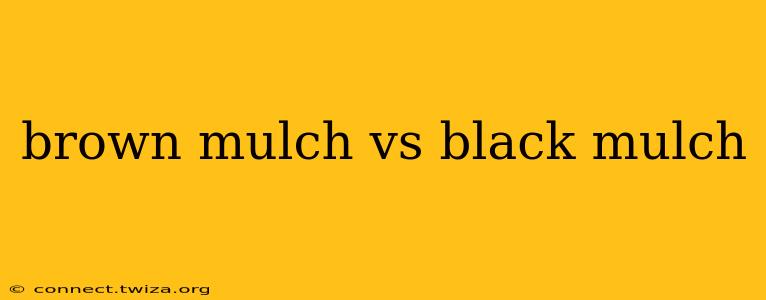Choosing the right mulch can significantly impact your garden's health and aesthetics. Brown and black mulches are popular choices, each offering unique benefits and drawbacks. This comprehensive guide will help you decide which one best suits your needs.
What are the key differences between brown and black mulch?
The primary difference lies in their composition and resulting appearance. Brown mulch typically consists of natural materials like shredded hardwood, pine bark, or cypress. Its color ranges from light to dark brown, offering a more natural and earthy look. Black mulch, on the other hand, is often dyed, using a mixture of natural and/or synthetic materials such as composted wood, cocoa bean hulls, or even recycled rubber. This dyeing process gives it its distinctive dark color.
What are the pros and cons of brown mulch?
Pros:
- Natural Appearance: Brown mulch blends seamlessly with most garden landscapes, creating a more natural and organic aesthetic.
- Excellent for Soil Improvement: Many brown mulches, especially those made from hardwood or aged bark, decompose over time, enriching the soil with organic matter. This improves soil structure, drainage, and nutrient content.
- Widely Available: Brown mulch is readily available at most garden centers and nurseries.
- Environmentally Friendly (generally): When sourced sustainably, brown mulch is a generally eco-friendly option.
Cons:
- Color Fades: The brown color of the mulch can fade over time, especially with exposure to sunlight and rain.
- Slower Decomposition: Some types of brown mulch decompose slowly, requiring less frequent replacement but potentially releasing nutrients more gradually.
- Potential for Weed Seeds: Unless properly composted, brown mulch might contain weed seeds.
What are the pros and cons of black mulch?
Pros:
- Consistent Dark Color: The dyed black color remains consistent, providing a visually striking contrast against plants and other garden features.
- Effective Weed Suppression: The dark color can help suppress weed growth by reducing sunlight penetration to the soil surface.
- Soil Warming: Black mulch absorbs and retains heat, which can be beneficial in cooler climates or for early spring planting.
Cons:
- Less Environmentally Friendly (potentially): The dyeing process can involve chemicals, and some black mulches contain less natural materials than brown mulch. Always check the sourcing and composition of the product.
- Can Overheat Soil: The heat retention can be detrimental in hotter climates, leading to overheating and potentially harming plant roots.
- May Contain Additives: Certain black mulches may contain additives or chemicals, which might not be ideal for all plants or soil types.
Does black mulch retain more moisture than brown mulch?
Both black and brown mulch can help retain soil moisture, but their effectiveness varies depending on the material, thickness, and climate. Black mulch, due to its darker color, generally absorbs more solar radiation, leading to slightly higher soil temperatures and potentially faster evaporation. However, a thicker layer of either mulch will generally provide better moisture retention.
Which mulch is better for vegetable gardens?
For vegetable gardens, a well-composed brown mulch is often preferred. The slow decomposition enriches the soil over time, providing nutrients to your plants. However, the choice depends on your climate and specific plant needs. In hotter climates, a lighter-colored mulch might be better to prevent soil overheating.
Which mulch is best for flower beds?
Both brown and black mulch can work well in flower beds, depending on your aesthetic preferences and the specific needs of your plants. Black mulch might provide better weed control and enhance soil warming, while brown mulch creates a more natural look.
Conclusion: Choosing the Right Mulch for Your Garden
Ultimately, the best mulch for your garden depends on your individual needs and preferences. Consider factors like your climate, soil type, plant types, aesthetic preferences, and environmental concerns when making your decision. Both brown and black mulch offer unique advantages, and selecting the appropriate one will contribute to a healthy and thriving garden.
